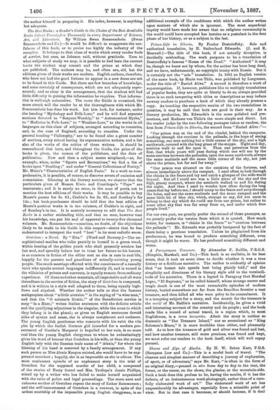Prison•Life in Siberia. By Feeder Dostoleffeky. Sole and authorised translation,
by H. Sutherland Edwards. (T. and E. Maxwell.)—The title of this book, if not actually deceptive, is decidedly misleading. The work purports to be a translation of Dostoleffsky's famous "House of the Dead." "Authorised" it may be, though we know not by whom, for the author has been long dead, and we have, unfortunately, no copyright treaty with Russia. But it is certainly not the " sole " translation. In 1881 an English version of the same book, by Marie von Tinto, was published by Longman, under the title of " Buried Alive." A second is therefore a work of supererogation. If, however, publishers like to multiply translations of popular books, they are quite at liberty to do so, always provided there is no such tampering with titles or descriptions as may induce unwary readers to purchase a book of which they already possess a copy. As touching the respective merits of the two translations in question, it may be said that both are good in their way. As a literary production, Mr. Edwards's is the more polished and pre- tentious, and Madame von Thilo's the more simple and direct. Let the reader judge by the two following passages taken at random, the first from Prison-Life in Siberia, the second from "Buried Alive :'- "Our prison was at the end of the citadel, behind the ramparts. Looking through the crevices in the palisade, in the hope of seeing something, one seen nothing but a little corner of the sky, and a high earthwork, covered with the long grass of the steppe. Night and day, sentries walk to and fro upon it. Then one perceives from the first, that whole years will pass during which one will see by the same crevices between the palisades, upon the same earthwork, always the same sentinels and the same little corner of the sky, not just above the prison, but far and far away."
"Our prison was situated on the outskirts of the fortress, and almost immediately above the rampart. I used often to look through the chinks in the fence and try and catch a glimpse of the wide world beyond. But all I could see was a little piece of the sky and the high, grassy rampart, where the sentinels walked to and fro during the night. And then I used to wonder how often during the long years that lay before me, I should creep to the fence and peep through the holes, and see the same sentinels and the same rampart and the same little bit of blue sky, which, strange to say, did not seem to belong to that sky which we could see from our prison, but rather to some other sky that was far away from us, and under which free people lived."
For our own part, we greatly prefer the second of these passages, as we greatly prefer the version from which it is quoted. How much better, for instance, ie "chinks in the fence" to " crevices between. the palisade "! Mr. Edwards was probably hampered by the fact of there' being a previous translation. Unless he plagiarised from his predecessor, he was bound to produce something different, even though it might be worse. He has produced somethffig different and worse.


















































 Previous page
Previous page